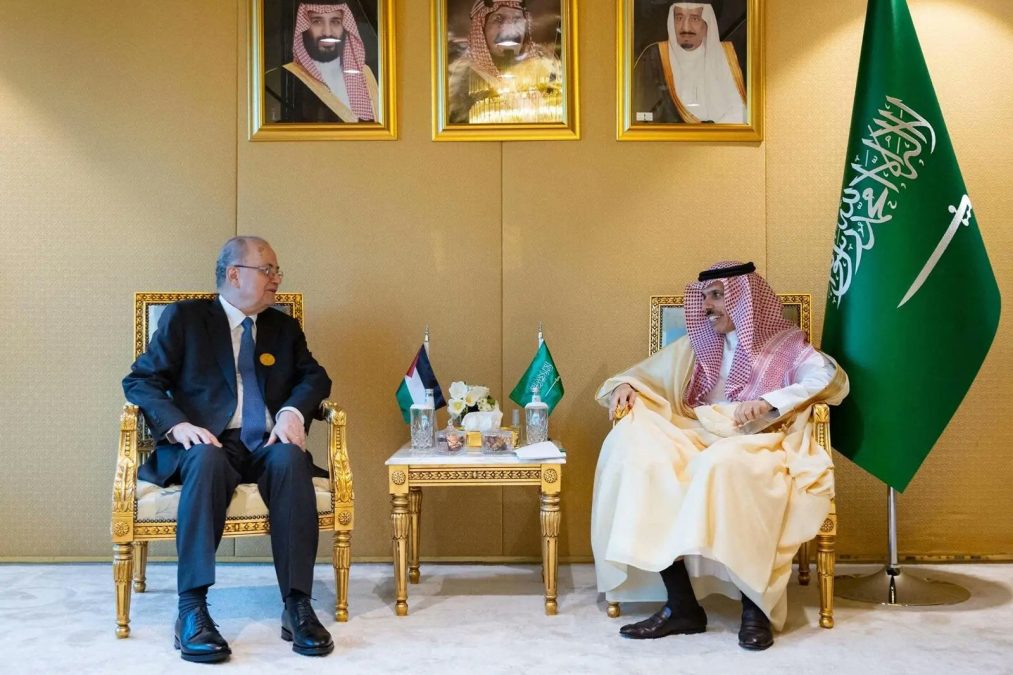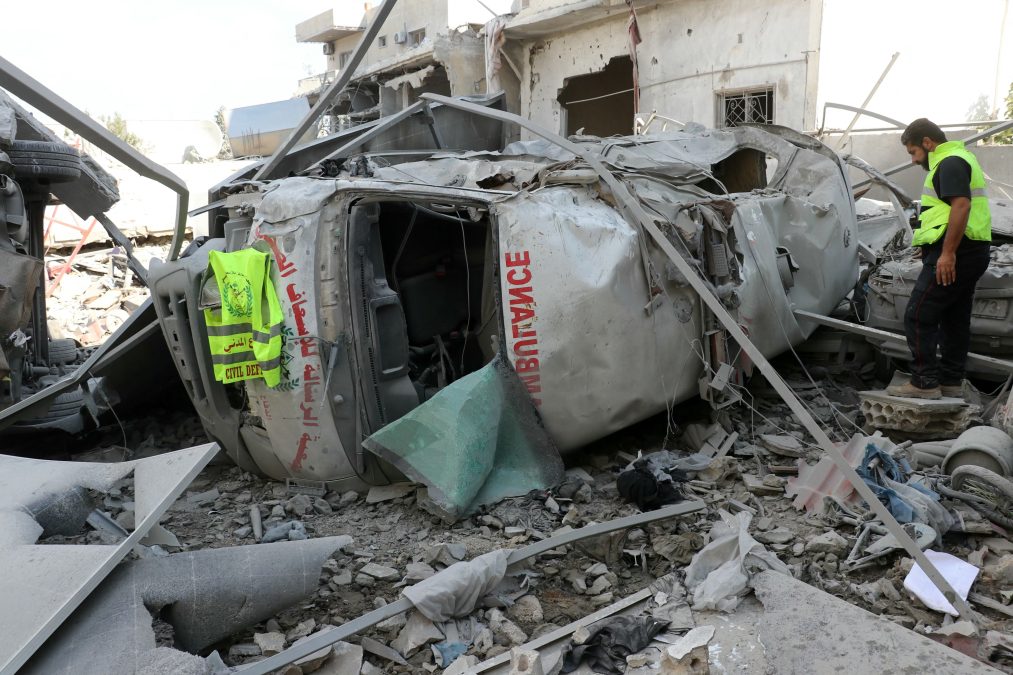Riyadh/Jerusalem — Arab and Muslim leaders gather in Saudi Arabia Monday for a summit addressing the wars in Gaza and Lebanon, a chance to send a message to US President-elect Donald Trump.
The Saudi foreign ministry announced plans for the summit in late October during a meeting, also in Riyadh, of a new “international alliance” to press for the establishment of a Palestinian state.
It comes one year after a similar gathering in Riyadh of the Cairo-based Arab League and the Jeddah-based Organization of Islamic Cooperation during which leaders condemned Israeli forces’ actions in Gaza as “barbaric”.
This time around, Trump’s election last week for a second term in the White House is likely to be on leaders’ minds, said Anna Jacobs, senior Gulf analyst for the International Crisis Group think tank.
“This summit is very much an opportunity for regional leaders to signal to the incoming Trump administration what they want in terms of US engagement,” she said.
“The message will likely be one of dialogue, de-escalation, and calling out Israeli military campaigns in the region.”
The war in Gaza erupted with Hamas’s unprecedented attack on southern Israel on October 7 last year, which resulted in 1,206 deaths, mostly civilians, according to an AFP tally of Israeli official figures.
Israel’s retaliatory campaign has killed more than 43,600 people in Gaza, most of them civilians, according to data from the Hamas-run territory’s health ministry that the United Nations considers reliable.
Lebanon-based Hezbollah, which like Hamas is backed by Iran, began firing on Israel after the October 7 attack. The regular cross-border exchanges escalated in late September when Israel intensified its air strikes and sent ground troops into southern Lebanon.
Despite criticism of the impact Israel’s military campaign has had on Gaza civilians, outgoing US President Joe Biden ensured that Washington remained Israel’s most important military backer during more than a year of fighting.
TRUMP AND ISRAEL
In his first term, Trump’s actions showed him as an even firmer supporter of Israel. He defied international consensus by recognizing Jerusalem as Israel’s capital and moving Washington’s embassy there.
He also endorsed Israeli settlements in the occupied West Bank, which are illegal under international law.
Under the Abraham Accords, Trump oversaw the establishment of diplomatic relations between Israel, the United Arab Emirates and Bahrain, as well as Morocco.

Though Saudi Arabia did not join those agreements, Trump cultivated warm ties with the Gulf kingdom while in office and has deepened his business connections to the region during the Biden years.
Saudi Arabia has pressed pause on a US-brokered deal where it would recognize Israel in return for security and economic benefits, insisting there will be no diplomatic ties without a Palestinian state.
Umer Karim, an expert on Saudi politics at the University of Birmingham, said Riyadh will use Monday’s summit to signal to the incoming Trump team that it remains a strong partner.
The message is that Trump “can rely on the Saudis as being representatives of the Muslim world”, and that “if you want to extend American interests in the region, Saudi Arabia is your bet”, he said.
The 57-member OIC and 22-member Arab League include countries that recognize Israel and those firmly opposed to its regional integration.
Last year’s summit in Riyadh saw disagreement on measures like severing economic and diplomatic ties with Israel and disrupting its oil supplies.
Karim said the post-summit statement on Monday will likely “strongly condemn Israel… while also pushing for greater American leverage and diplomacy on the issue.”
The November 2023 meeting featured an appearance by Iran’s then-president Ebrahim Raisi, highlighting how regional diplomacy has changed since Trump was last in office.
In March 2023, Iran and Saudi Arabia announced a China-brokered rapprochement after seven years of severed ties. The Middle East heavyweights have maintained regular high-level contact as part of efforts to contain the ongoing conflicts.
Iranian state media said the chief of staff of the Saudi armed forces was to arrive in Tehran Sunday for talks, a rare high-level visit.
ISRAELI ATTACKS CONTINUE
Israeli air strikes killed dozens of people in Lebanon and Gaza Sunday, rescuers and authorities said, ahead of a US deadline for improved aid delivery to the Palestinian territory.
Another strike south of the Syrian capital Damascus killed nine people including a Hezbollah commander, a war monitor said.
Rescuers in the Gaza Strip said 13 children were among 30 people killed by Israeli strikes in the territory’s north.
The first hit a house in Jabalia, killing at least 25 people including 13 children and injuring more than 30, Gaza’s civil defense agency said.
At around 6:00 am, “there was a very huge explosion” at the Alloush family home, said relative Abdullah al-Najjar.
“When we arrived here, all the bodies were torn apart.”
Vowing to stop Hamas militants from regrouping in already ravaged north Gaza, Israel on October 6 began a major air and ground assault.
The United Nations has described the area as “under siege”, and Washington set a deadline of this coming week for Israel to get more aid in or face possible cuts to military assistance.
After the Jabalia strike, Israel’s military said it hit “infrastructure” in which militants were operating and “posed a threat” to troops.
Another strike on Gaza City’s Sabra neighborhood killed five people, the civil defense agency said.
LEBANON SITUATION
In Lebanon, the health ministry said an Israeli strike on Almat village north of Beirut killed 23 people including seven children.
“Under the rubble, there are only children, elderly men and women,” Hezbollah lawmaker Raed Berro said, denying Israeli allegations that Hezbollah and weapons were embedded among civilians.
The ministry reported at least another 15 dead in strikes in the east as well as three Hezbollah-affiliated rescuers killed in the south, both areas where the Iran-backed group has a strong presence.
War monitor the Syrian Observatory for Human Rights reported that an Israeli strike on an apartment belonging to Hezbollah south of Damascus killed nine people, including a Hezbollah commander.
Iran’s foreign ministry condemned the strike, calling for “an arms embargo” on Israel and its “expulsion from the United Nations”.
Since late September Israel has been engaged in a two-front war after turning its focus north towards Lebanon.
Israel admitted for the first time Sunday it was behind a wave of deadly attacks on Hezbollah communications devices in September.

Israeli Prime Minister Benjamin Netanyahu “greenlighted the pager operation in Lebanon” in which hundreds of devices exploded, killing nearly 40 people and wounding around 3,000, his spokesman said.
The operation preceded Israel’s ongoing air and ground campaign in Lebanon, after almost a year of tit-for-tat exchanges of fire with Hezbollah, which said it was acting in support of Hamas.
On Sunday, Israel’s military said it intercepted two drones approaching from the east. Pro-Iran groups in Iraq have previously said they launched attack drones at Israel.
AID DELIVERY DEADLINE
Israel’s main military backer the United States on October 15 warned that it could withhold some of its billions of dollars in assistance unless Israel improves aid delivery to the Gaza Strip within 30 days — a deadline that expires on Wednesday.
State Department spokesman Matthew Miller said at the time top US officials made “clear” to Israel’s government that changes need to be made “to see that the level of assistance making it into Gaza comes back up from the very, very low levels that it is at today”.
The demand came before Tuesday’s vote for President-elect Donald Trump, who has suggested he would give freer rein to Israel.
On Saturday, a UN-backed assessment warned that famine is imminent in northern Gaza.
Fewer aid shipments were allowed into Gaza than at any time since October 2023, according to the Integrated Food Security Phase Classification (IPC) report.
The alert from the Famine Review Committee warned of “an imminent and substantial likelihood of famine occurring, due to the rapidly deteriorating situation”.
Israel’s military questioned the report’s credibility, denouncing “partial, biased data and superficial sources with vested interests”.
German Foreign Minister Annalena Baerbock said that “humanitarian access must be granted at all times and must never become a means of warfare”.
She said that “time and again” promises of aid were not kept, and that an Israeli pledge to flood Gaza with aid “must happen, without excuses”.
The heads of UN agencies in early November described north Gaza as “under siege” and denied “basic aid and life-saving supplies”.
Arab and Muslim leaders are gathering in Saudi Arabia for a summit on Monday that will focus on the wars in Gaza and Lebanon.
On Saturday, Gaza mediator Qatar said it had suspended its role in trying to broker a deal.








